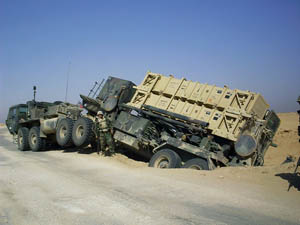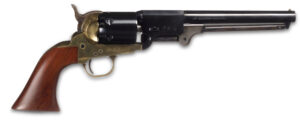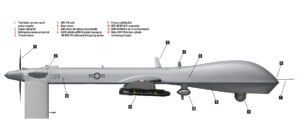The next morning, grimy from the previous day’s sweat and a fresh coat of desert silt, we crossed into enemy territory. It gave me an eerie feeling to finally see the famous berm dividing Kuwait and Iraq that everyone talked about. The friendly stares of the Kuwaiti soldiers at the border were the last eye contact we would have with an ally for a while. Despite the dangers we had experienced in Kuwait, we were apprehensive about leaving its relative comfort and safety for a place where we could be attacked at any time. Fatigue and fear were washed away by adrenaline coursing through our veins.
As we entered Iraq, a sandstorm of biblical proportions struck our unit. We could not see the road five feet ahead of us. Every couple of minutes I used my index finger like a windshield wiper to scoop a layer of silt away from the inside and outside of my glasses. Sand made its way onto my teeth as well. Our trucks began to get stuck in the silt, and the more the wheels spun, the deeper the tires sank. While the oil pipeline route in western Iraq utilized secondary roads to Baghdad and thus offered less enemy resistance, it was also slower thanks to the more arduous terrain.
 As the winds died down, we saw the aftermath of the initial American assault several days earlier. Broken-down American vehicles and trailers littered the road. They had been completely gutted by the locals. The black market would quickly find new owners for these tires and windshields. Flatbed trucks carrying two destroyed U.S. helicopters drove in the other direction past us toward Kuwait. It was demoralizing to see the crippled American equipment, and it stirred a desire for revenge. That is, until we saw what had happened to the enemy’s equipment. Scores of charred tanks and trucks lay scattered along the side of the road. Some Iraqi tanks appeared to have sought the cover of civilian houses and garages before American helicopters destroyed them. We also saw Iraqi uniforms and boots strewn on the side of the road by retreating soldiers eager to blend into the local populace and avoid the American assault.
As the winds died down, we saw the aftermath of the initial American assault several days earlier. Broken-down American vehicles and trailers littered the road. They had been completely gutted by the locals. The black market would quickly find new owners for these tires and windshields. Flatbed trucks carrying two destroyed U.S. helicopters drove in the other direction past us toward Kuwait. It was demoralizing to see the crippled American equipment, and it stirred a desire for revenge. That is, until we saw what had happened to the enemy’s equipment. Scores of charred tanks and trucks lay scattered along the side of the road. Some Iraqi tanks appeared to have sought the cover of civilian houses and garages before American helicopters destroyed them. We also saw Iraqi uniforms and boots strewn on the side of the road by retreating soldiers eager to blend into the local populace and avoid the American assault.
On a day typically reserved for practical jokes, the chaos of a missile attack in Kuwait developed into an assault that was by turns comical and eye-opening. As part of one of the most successful invasions in the history of warfare, we were not in the thick of fighting, and we found ourselves in Baghdad within several weeks of the war’s first shots. In those initial days, though, the members of our unit were baptized in the fear and discomfort of war, by the extraordinary heat, momentum-halting sandstorms, and enemy missiles—an experience that, however clichéd the phrase may be, truly changed us forever.
West Point graduate Carl Ciovacco received the Bronze Star Medal for his actions in Iraq in 2003. After redeploying to Germany, he was promoted to captain and served as battalion adjutant for the 6-52 Air Defense Artillery. He is currently a defense and security consultant in Washington, D.C.





